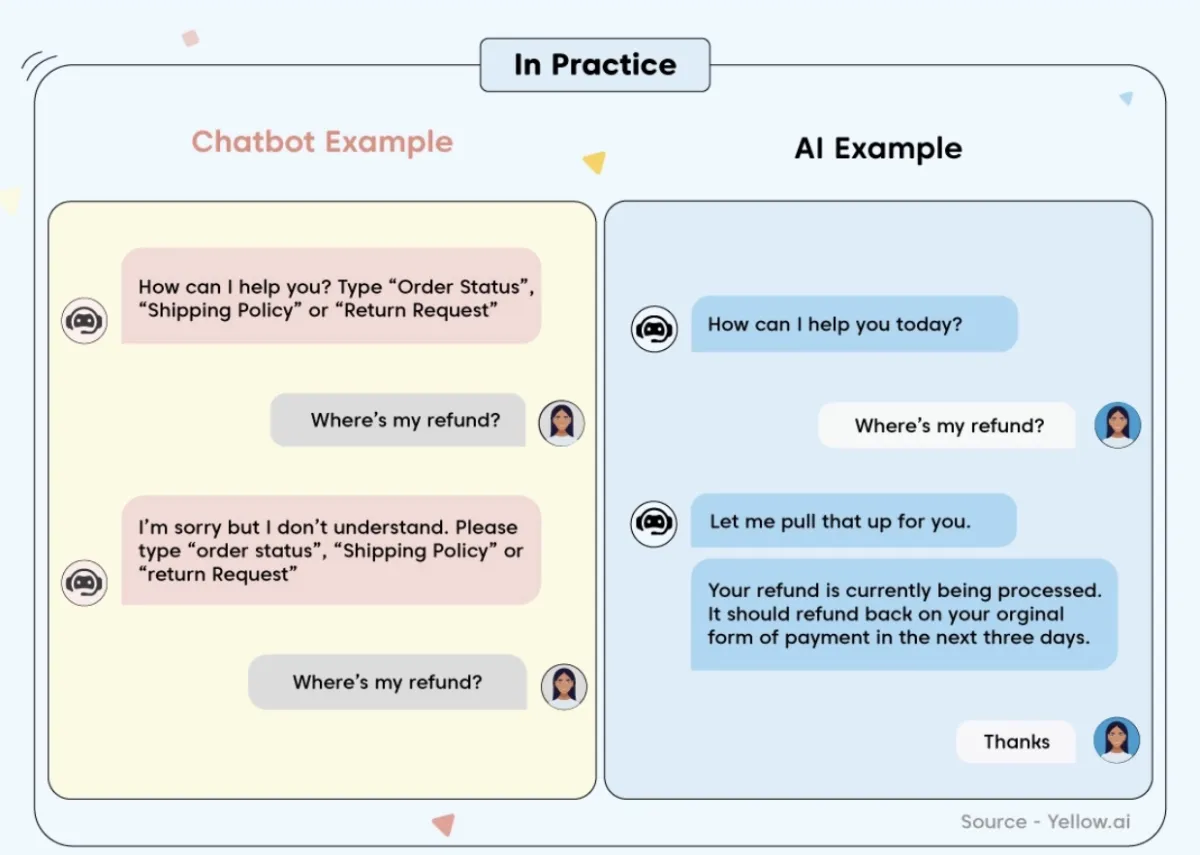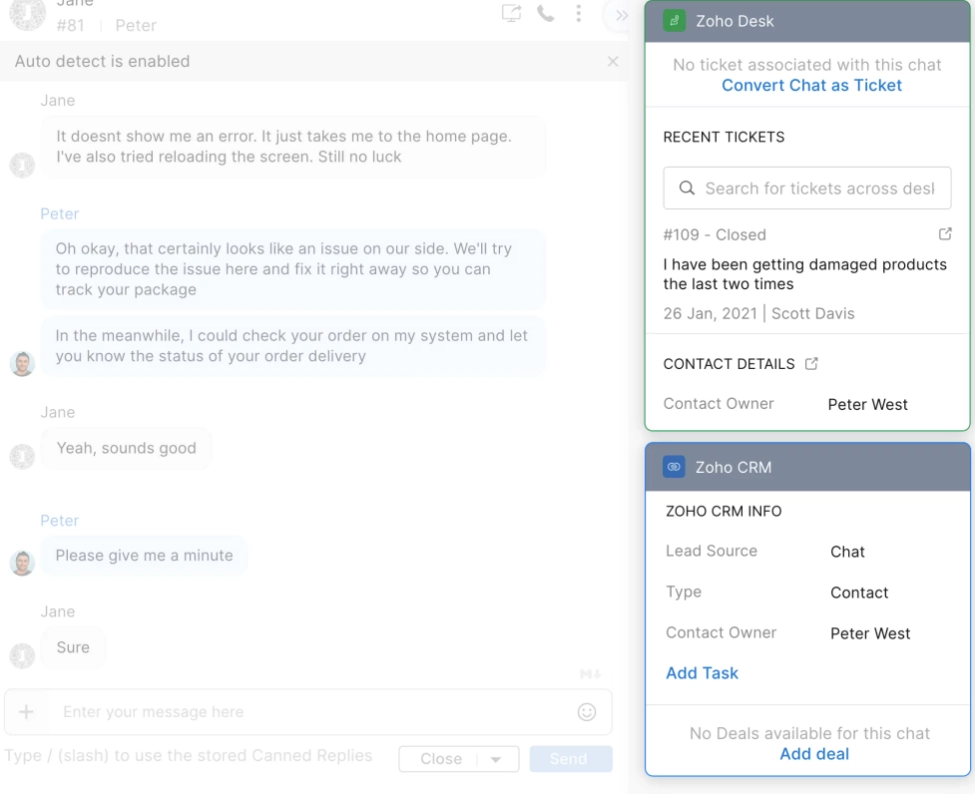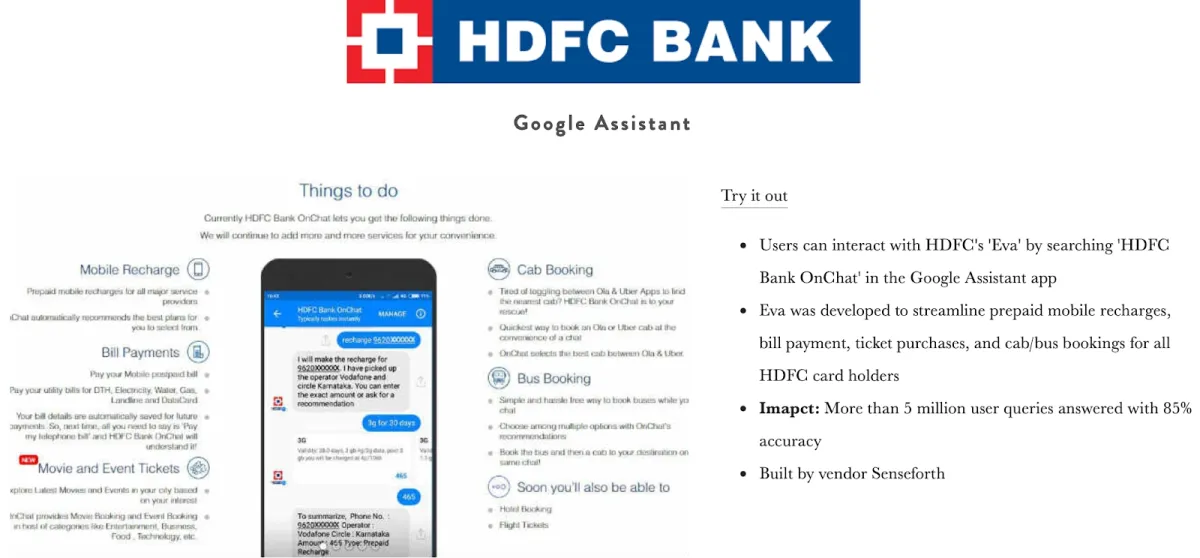The sales landscape has evolved dramatically with technology playing a critical role in modern conversational sales strategies. Sales managers, however, face a complication: Managing a growing number of leads while maintaining the personalized approach required for successful conversions.
Conversational automation provides a resolution to this challenge by integrating AI-powered systems that engage prospects, answering their questions and guiding them through the sales funnel. Nearly 50% of the customers state that they are willing to close a sale only by using a conversational marketing bot.1
This article explores the use cases of conversational AI for sales, demonstrating its transformative potential for businesses and sales managers alike.
What is conversational AI?
A conversational AI is a type of computer program designed to understand and respond to human language, both written and spoken, in a manner that simulates human-like conversation. It is built using natural language processing (NLP) techniques, machine learning, and other advanced computational technologies to interpret, analyze, and generate responses to human inputs.
Conversational AI aims to improve user experiences, provide efficient communication solutions, and reduce the workload of human staff in various industries.
What is the difference between conversational AI and chatbots?
Conversational AI is a broad term referring to technologies that enable human-like conversations through text or voice. When the input is spoken, automatic speech recognition (ASR) is activated to convert the speech into written text. Then, natural language understanding (NLU) is employed by the conversational AI to analyze the conversation, comprehend the context and interpret the meaning behind the customer’s words.
On the other hand, a chatbot is a specific application of conversational AI focused on text-based interactions, usually for customer service, information provision, or general conversation.
Comparison of chatbot and conversational AI chatbot in practice
Figure 1. Comparison of chatbot and conversational AI chatbot in practice

Source: Yellow.ai
For more on the differences between the two, check our article comparing conversational AI and chatbots.
What are the sales-related applications of conversational AI?
Conversational AI can be found in various applications, such as:
- Chatbots: AI-powered chatbots can assist with customer service, answer questions, and provide information on websites, messaging platforms, or social media.
- Virtual assistants: Devices like Amazon’s Alexa, Apple’s Siri, and Google Assistant use conversational AI to perform tasks, provide information, and engage in conversation with users.
- Messaging platforms: AI systems can facilitate messaging between users, help businesses automate responses to customer inquiries, and even perform language translations.
- Customer support: Conversational AI can handle routine inquiries, resolve issues, or escalate complex matters to human support staff, helping them to meet customer expectations.
These applications lower operational costs while fostering customer loyalty, which boosts sales productivity.
What are the use cases of conversational AI for sales?
Conversational AI can be applied in various ways to enhance the sales process, improve customer experience, and drive revenue. Some applications include:
1- CRM integration
Conversational AI can be integrated with CRM systems, automatically updating lead or customer information, ensuring sales teams have accurate and up-to-date records for better relationship management.
Sponsored: Zoho SalesIQ offers integration with Zoho CRM and Zoho Desks. This way, users can transfer chat data to CRM, access customer information and related support tickets during chats, and convert chats into support tickets within one platform (Figure 2).

Figure 2: Zoho SalesIQ CRM integration
2- Booking appointments
AI-powered chatbots or virtual assistants can schedule sales meetings, product demos, or consultations with sales representatives, streamlining the process and minimizing manual effort.
HDFC Bank uses a conversational chatbot named “Eva”, developed with Google Assistant, to facilitate some of the bank’s services such as bill payments, ticker purchases, cab/bus bookings for the bank’s card holders (see Figure 2). This enabled the response efficiency, by replying 5 million user queries with 85% accuracy.2
Figure 3. HDFC’s chatbot “Eva”

Source: Chatbot Guide
Another example is KLM, which uses Google Assistant powered by AI to provide customers with a conversational setup for scheduling, tips, destination information, and so on.
3- Customer support
Conversational AI can handle common customer queries, resolve issues, or guide customers through the buying process, providing timely assistance and enhancing the customer experience.
For example, eBay uses a conversational Facebook Messenger bot to enable customers to have a personalized shopping experience both by written text and voice message.
4- Lead generation
Conversational AI can engage with website visitors or social media users, identify potential leads, collect contact information, and pre-qualify them before forwarding them to the sales team.
5- Product recommendations
By analyzing user preferences, browsing behavior, or asking questions, conversational AI can suggest relevant products or services, improving personalization and increasing the chances of making a sale.
6- Sales training and coaching
Conversational AI can be used to train sales reps by simulating customer interactions, providing feedback, or offering guidance on best practices for handling different sales situations.
7- Upselling and cross-selling
By analyzing customer interactions, past purchases, or responses to promotional offers, conversational AI can identify opportunities to upsell or cross-sell products or services.
Conversational AI vs chatbots in sales
While chatbots are a specific application of conversational AI, there are some differences in their capabilities and applications in the context of sales.
Chatbots
Pros
- They are primarily designed for text-based interactions, and their primary focus is on customer support and lead qualification.
- They can handle common customer queries, provide basic information, and pre-qualify leads before transferring them to a sales rep.
Cons
- Chatbots are typically limited in their ability to handle complex sales conversations or provide more personalized recommendations
Conversational AI
Pros
- Conversational AI, with its more advanced capabilities, can provide more personalized recommendations based on user preferences and browsing behavior.
- Conversational AI can identify specific words or phrases in a conversation that can be utilized to anticipate when the prospect or customer is ready to make a purchase.
- Conversational AI can be used for CRM integration, booking appointments, and even sales training and coaching, which cannot be achieved by chatbots alone.
Cons
- Since conversational AI can be a more expensive tech solution, unless your enterprise is data-heavy, a chatbot is a better choice than a conversational AI application.
If you have questions or need help in finding vendors, we can help:

Comments
Your email address will not be published. All fields are required.